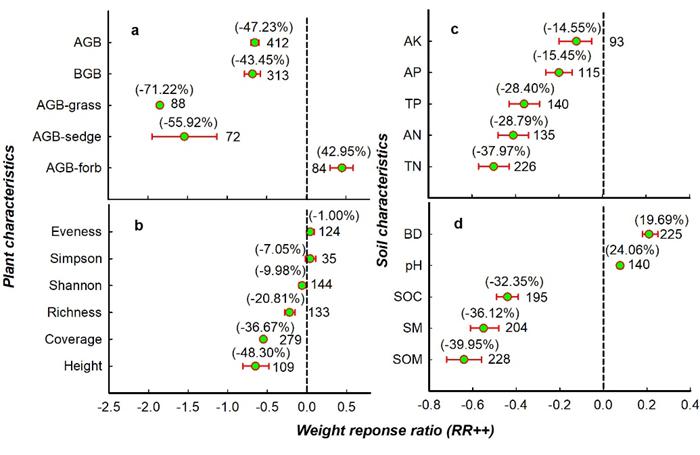Name:ZUO Juan
Tell:
Email:zuojuan@wbgcas.cn
Organization:Wuhan Botanical Garden
Research Reveals the Effects of Nutrient Addition on Degraded Alpine Grasslands of the Tibetan Plateau
2020-09-04
Climate warming and human disturbance are supposed to severely affect the alpine grasslands on the Tibetan Plateau, a region where the extremely harsh and fragile ecological environment has attracted great attention because of its sensitivity to global change. However, there is still no unified understanding of the degree and magnitude of grassland degradation and the effectiveness of nutrient addition in this vast landscape, since most previous studies have focused on short-term observations at a single site.
WANG Dangjun, a PhD student of Function Ecology Group of Wuhan Botanical Garden, conducted a meta-analysis of 145 published studies on degraded alpine grassland along with 90 published studies, which concerning nutrient addition (nitrogen [N], phosphorus [P], and combined N and P [NP]) to quantitatively assess the responses of plant and soil characteristics to land degradation and restoration.
The results revealed that the response ratio (RR) of above-ground biomass (AGB), below-ground biomass (BGB), soil organic carbon (SOC), and soil total N (TN) decreased significantly (-47.23 %, -43.45 %, -32.35 %, and -37.97 %, respectively) in degraded grassland compared with non-degraded grassland. The RR of AGB was correlated with mean annual precipitation (MAP), while the RR of BGB was correlated with the interaction of MAP and mean annual temperature (MAT). NP addition to severely degraded sites increased plant AGB (+32.44 %), TN (+10.99 %), soil total P (+32.25 %), and soil moisture (+9.21 %), but significantly decreased species richness (-45.46 %), diversity (-30.40 % for Shannon- Wiener index) and soil pH (-3.91 %). N addition increased the RR of AGB and grass biomass significantly by 28.77 % and 36.49 %, but had no significant effect on sedge and forb biomass.
The study evidences that the Tibetan Plateau has endured severe vegetation and soil degradation, which cannot be completely mitigated by supplementary fertilisation. Fertilisation could yield positive effects on plant performance and soil quality, but negative effects on biodiversity. Climate warming and associated precipitation change may regulate the effects of fertilisation on plant biomass and soil nutrients.
This research entitled "Effects of nutrient addition on degraded alpine grasslands of the Qinghai-Tibetan Plateau: A meta-analysis” was published in Agriculture, Ecosystems and Environment.

Weighted response ratio (RR++) of vegetation biomass (a), species diversity (b), and soil quality (c, d) in degraded alpine grasslands (Image by WANG Dangjun)